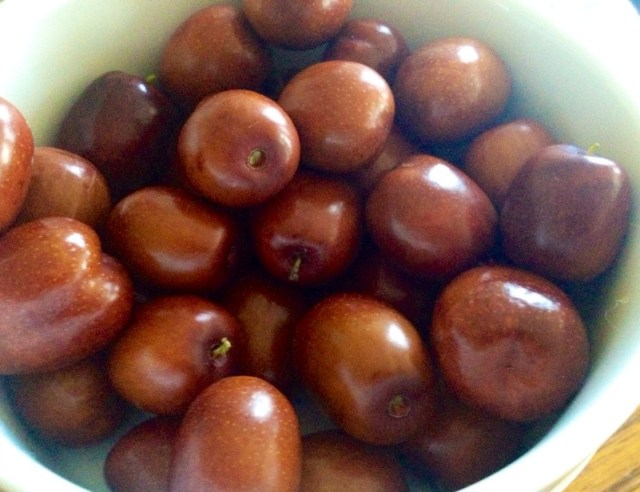
I’ve been told that jujubes have been used as part of traditional Chinese medicine for at least 2,500 years, and that they’re great for those with weaker constitutions or frailer health. Drinking jujube tea regularly is supposed to be a great health tonic, and can improve your blood circulation and immune system. Even jujube pits are made into a medicine to heal wounds and treat abdominal pain; the leaves are supposed to help with fevers; and the fruit great for overall physical well-being. Jujube wood is also made into mala prayer beads for meditation, and the metaphysical properties for jujube wood is believed to facilitate spiritual healing.
For women who care about beauty, jujube juice helps improve skintone and complexion, and is supposed to help with beauty. Hey. I’m sold. Pour me some of that jujube juice! It’s also my understanding that they’re “warm,” and so great for those with “cooler” constitutions, like me. So I’ve been trying to improve my health (and hey, I’ll admit it, beauty) with regular dosages of jujube tea. Fortunately, we have a jujube tree in our front yard.

In the spring and early summer, the jujube tree blooms these delicate white and fragrant blossoms. In the above photo, they haven’t reached their full whiteness yet. I took this pic last spring. Jujube blossoms symbolize love and romance in Eastern cultures, an association likely to have come from the fragrant scent of these flowers.

By late summer, the tree is just exploding with fruits, ripening in batches. You can still pick the green ones to eat– I’ve tried. However, the red ones are much sweeter. Jujubes are crisp and sweet, and taste like delicate apples. These sweet little fruits are said to be cardiotonic, antioxidant, immunostimulant, and possess wound healing properties. (That was a mouthful.)

By Mid-Autumn Festival, it’s time to harvest the jujubes. Our one tree produces more fruits than we can finish. We give them away in batches to our neighbors (who seem to love these sweet jujubes!) and still we have plenty more. So at the close of autumn, Hubby and I harvest all of the remaining jujubes and dry them in our solarium.

Something really cool happens once they’re dried. The fresh jujubes from our tree are this dark maroon color. However, once they’ve been dried, they turn a bold, brilliant red. It’s so cool. We then store away the dried jujubes in our pantry and throughout the winter and early spring months, before the tree blooms again the following year, we make jujube tea or plop them into winter soups.
A Korean version of jujube tea is a whole bunch of dried jujubes, ginger root, a fresh Asian pear cut into quarters, and honey. Simmer everything together sans honey for 3-4 hours and then drain. Taste for sweetness and if you need more sweetness (you probably won’t– these are pretty sweet naturally), add the honey. Personally, I like plain jujube tea– just a ton of jujubes, water, and rock sugar (or brown sugar) simmered for 3 hours, stirring on occasion accompanied by prayer or mantras (to further infuse them with metaphysical goodness). Drain the contents so all that’s left is a beautiful golden sweet tea. If you have a sweet tooth, then jujube tea is for you. Refrigerate for a phenomenal iced jujube tea. It’s sweet, detoxifying (supposedly), and great for your health. If anything, the tea is loaded with Vitamin C and should help ward off colds and the flu throughout the winter.
The metaphysical properties associated with jujubes is that of healing, both spiritual and physical healing, and the improvement of health. Given what we know scientifically about the health benefits of these fruits, the metaphysical properties sure make sense. Jujubes also represent feminine beauty, sensuality, and romance. They’re great to work with energetically if you’re looking for love. Personally, I adore the sweet tea these lovely little fruits produce. Sweet jujube tea is for sure one of my favorite herbal teas.

Normally when someone says “traditional Chinese medicine,” I think of some black, awful-smelling liquid that is bubbling away like tar on my mother’s kitchen stove, chock full of creepy looking bits of bark. And the result is a tonic that tastes as awful as it looks and smells (but cures whatever it is you had like magic). However, jujube tea is amazing. It’s sweet, light, refreshing, and you’d hardly believe you’re drinking something that’s good for you. For those who are into holistic health and wellness, definitely give jujube tea a try!

I make this almost everyday 🙂
LikeLiked by 1 person
I can’t believe you got a tree?? I’m so jealous….
LikeLiked by 1 person
Ha ha, yes. We have a bunch of fruit trees around our yard. It’s part of why we bought this house.
LikeLiked by 1 person
The tea sounds sooo good! I’m now researching whether jujube can grow in NC! (Funny, I thought jujubes were only those funny little licorice-like hard and resinous tiny round candies!)
LikeLike
I hope for a great harvest for your jujube tree! If it doesn’t bloom fruit in the first year, don’t be dejected– hang in there– sometimes it may take a few years. =)
LikeLike
I eat three of these (organic) a day and just ran out! My supplier no longer replies about me buying the 5 or 6 pound bags and I’m desperate for more. Do you know of any organic suppliers who sell that sort of volume? Thanks!
LikeLike